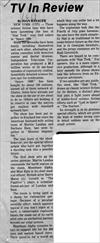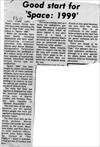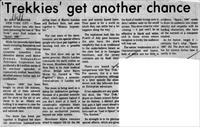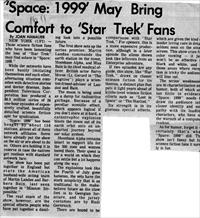Press
Space: 1999 May Fill A Void
This was an agency news report by Joan Hanauer that was syndicated to local newspapers in the USA in September 1975. Many of them edit it down, but this is the full version.
by Joan Hanauer
NEW YORK (UPI) - Those science fiction fans who have been lamenting the loss of Star Trek may find solace in Space: 1999.
While the networks have been busily imitating themselves and each other, alternating situation comedies with detective stories and doctor dramas, Independent Television Corporation has produced a $6.5 million series of 24 one-hour episodes of expensively crafted, beautifully detailed science fiction epic for syndication.
Space: 1999 has been bought by about 150 stations, almost all of them network affiliates. Some have already put the show on the air or are about to do so. Others are holding it in reserve in case the natives get restless with standard network fare.
The show has been put together in England but stars the American husband-wife acting team of Martin Landau and Barbara Bain, last seen together in Mission: Impossible. The real stars of the show, however, are the special effects people who have put together a dazzling look into a possible future.
The first show sets up the series premise. Martin Landau commands the earth station on the moon, Moonbase Alpha, and Miss Bain is its chief medical officer. British actor Barry Morse (Lt. Gerard in The Fugitive) plays a scientist-friend-adviser of Landau and Bain.
They moon is being used a dump for radioactive garbage. Because of a peculiar scientific effect, which appears logical if you don't stare at it hard, a catastrophic explosion blasts the moon out of its earth orbit onto an uncharted journey beyond our solar system.
Moonbase Alpha remains intact to support life for the 300 men and women based there. Their question is for a world on which they can settle but a lot happens along the way.
The explosions look like the Fourth of July gone bananas, the sets have the stark simplicity that is as traditional to the make-believe future as the claw foot is to Georgian furniture, and the jersey costumes are by Rudi Gernreich.
There are bound to be comparisons with Star Trek. For openers, this is a more expensive production, although in a later episode the aliens shown look like leftovers from an Enterprise adventure.
If two episodes are any guide, this show, like Star Trek, draws on classic science fiction for its themes, a distinct plus that puts it light years ahead of kiddie-level science fiction efforts such as Lost in Space or The Starlost.
Its strength is in its glorious special effects, which are given the kind of tender loving care in detail seldom seen on the small screen. This show cries for colour viewing - it just won't be as effective in black and white, and in those areas where reception is tricky the audience will lose out.
The series' weaknesses are in characterization and humour, both of which are too little in evidence. Space: 1999 needs to draw its audience into closer identity and empathy with its leading characters, who have all the warmth of a computer readout...
As for humour, forget it - certainly that's what Space: 1999 did. The show isn't funny but for science fiction fans it surely is fun.



